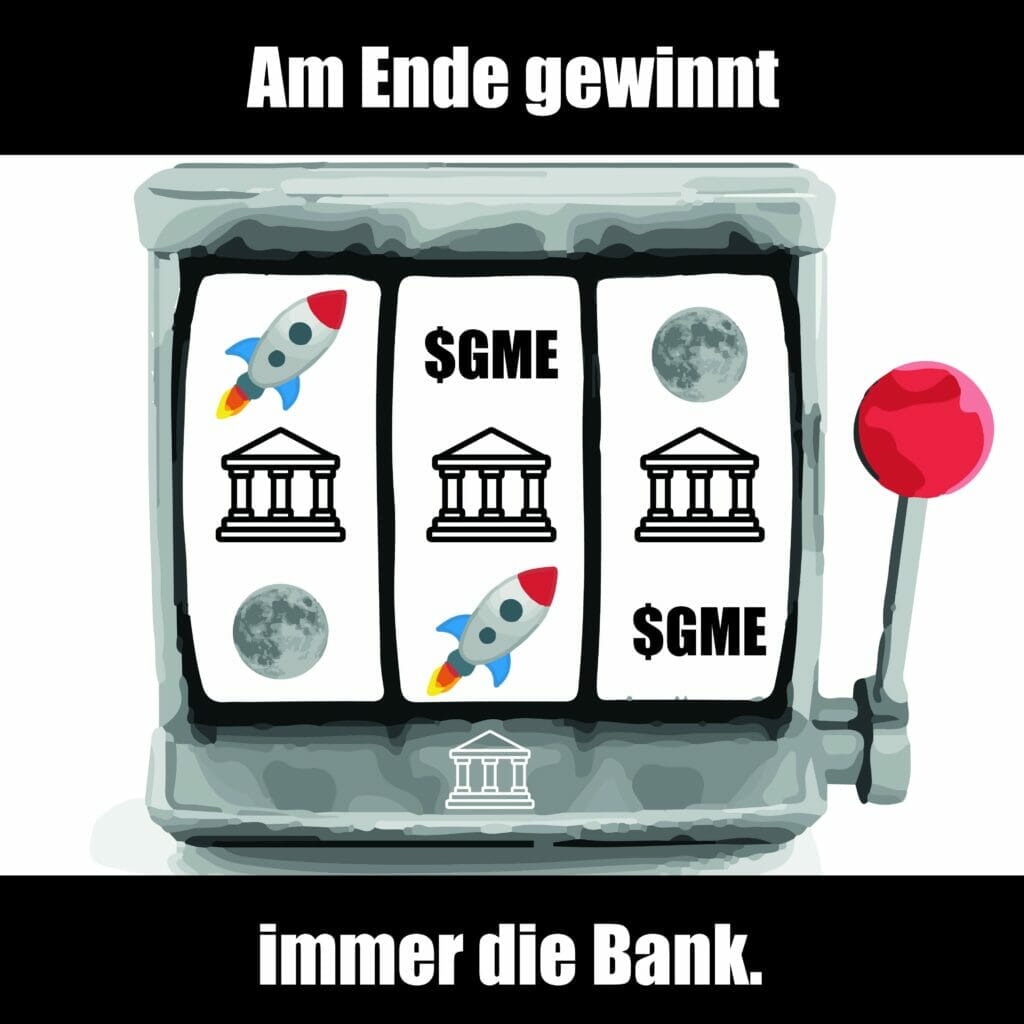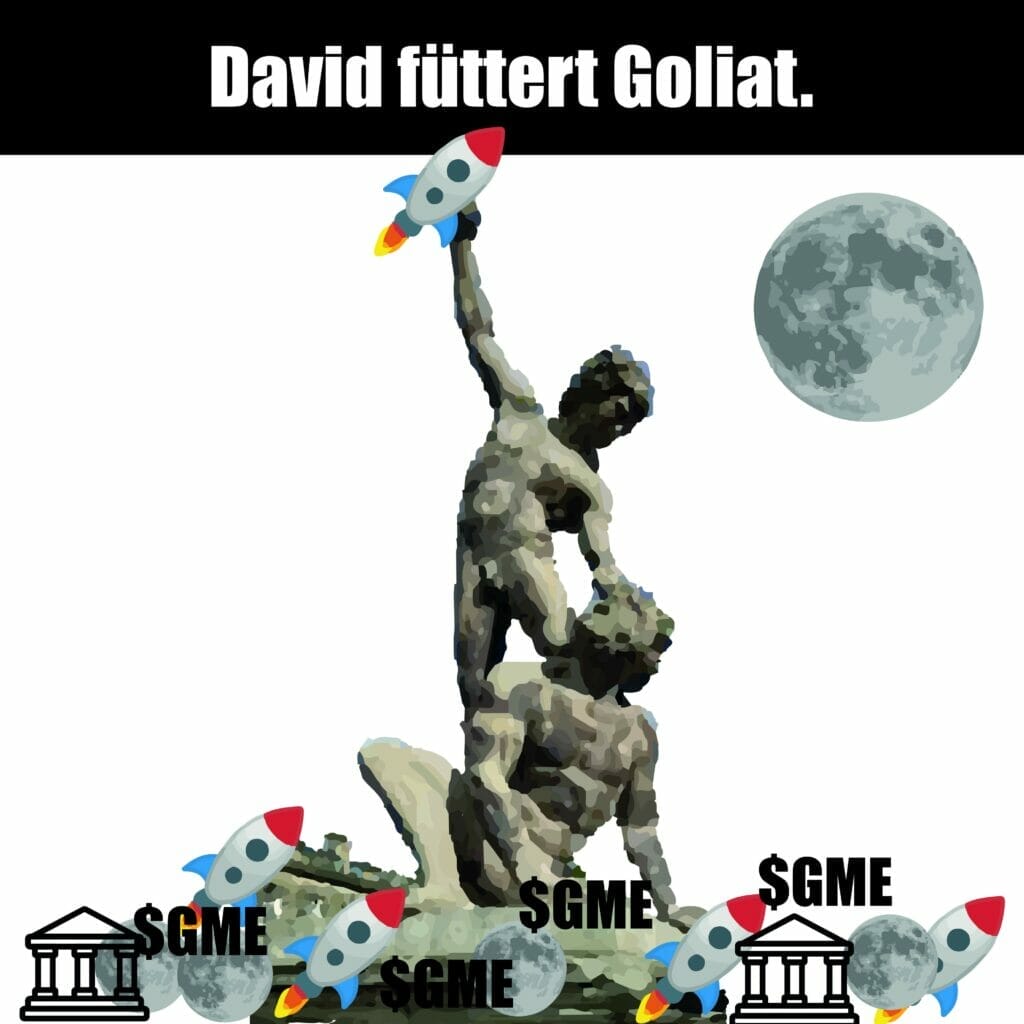Stocks as pop culture: The hype of Gamestop and Wallstreetbets
The supposed fight of “Wallstreetbets” and Wall Street offers best entertainment for weeks now. But the story tells more about dynamics of the markets than a heroic class struggle. An analysis.
Retail investors against the wolves of Wall Street, Reddit’s “Wallstreetbets” community against hedge funds — the supposed battle for sovereignty over financial markets has returned to focus one month after the supposed short squeeze of Gamestop and other stocks. But there are more diverse dynamics behind this.
Undoubtedly, the history has Hollywood potential. In a sober examination, however, the stories of David against Goliat or the class struggle quickly fizzle out.
The Romance of Redistribution
They sound obvious at first. Some investors have made significant returns, with screenshots going around in the “Wallstreetbets” subreddit for weeks, showing high profits from the Gamestop stock. In heartwarming stories, users tell how this sense of community has changed their lives. Winners proudly report using parts of their newly accumulated wealth for charity. Which hedge fund would do that…
So, it is a romantic redistribution from rich to poor? Only conditionally. Others have suffered more serious losses than the big gamblers because they joined the trend too late. The often conjured up class struggle is hardly that. Even if it is often said in “Wallstreetbets” comments that the supposed losers only must wait long enough to profit themselves. It is not a loss unless you sell.
The myth of democratization
A term used and generally adopted by the neo-broker “Robinhood” is the “democratization of stock markets”. Low fees, ease of use — buying shares or riskier derivatives is as complicated as ordering a pizza.
The recent large number of retail investors may have unleashed a previously unknown power. It will probably soon lead to new regulations to prevent further cases such as Gamestop. When “financial experts” talk about illegal collusion and exploiting this power, the question arises: what is the difference between an investment or hedge fund that manages billions of euros and many people who make the same decision individually and thereby invest billions in a stock? They simply joined the casino now. Analysts and professionals can be just as wrong.
In addition, there is a very simple mechanism:
- The stock market is flooded with money, the demand for securities is increasing.
- The offer remains the same.
- Stock prices are rising.
The stock market is therefore has a higher inflation than real currencies. This is also evidenced by the fact that, despite the pandemic and massive economic downturns (Germany: -5%), the major stock market indexesincreased in the previous year and the DAX is at a record high these days. Profiteer is who has invested for a long time (or at the right time). Profiteer is who has invested for a long time (or at the right time).DAX – Monatliche Entwicklung 2021 | StatistaDer Dax beendete den Börsenmonat Februar 2021 bei einem Stand von 13.786,29 Punkten*. Im März des Vorjahres kam es zu…de.statista.com
Analyses that have not included this have been worthless for months. If it is indeed a bubble that will soon burst, the newcomers in particular will bleed. Then the world economy also gets quite big problems; it is a system that completely overheats. The “Wallstreetbets” investors, who are still facing the material losses from the 2008 financial crisis, especially in the US, are hoping for a slice of the pie before this.
But what is the point of this ‘democratization’ if a significant proportion cannot participate in it because of a lack of resources? Even with this “redistribution”, wealth remains within the upper percents. The privileges have only been extended, all players should be aware of this this casino. And an age-old rule has not changed as a result of all this: in the end, the bank wins.

For a long time, the stock market does not reflect the real value of companies anymore. If you want success, try to bet faster and more successfully than the crowd. Option trading and derivatives, which not only predict targets but define them with profit/loss risk, fuel this. Unlike sports betting, investors rarely suffer a total loss, at least in the case of traditional investments — in the long run, equities have mostly proved their worth with exceptions. However, it remains to be speculation, as AMD shares recently impressively demonstrated: without news coming from or about the company, the stock lost about 20 percent of its value due to options trading. Apart from that, developments show that investing in stocks means to place a bet for the future.
Now to Gamestop. Here we should first clean up with a few prejudices. For example, the user DeepFuckingValue (DFV) aka Roaring Kitty, often referred to as a “leader”. That is simply wrong. In the subreddit “Wallstreetbets” he is one of 9.2 million users. He has more than 270,000 followers on Twitter, but his posts — mostly gamestop memes and live stream announcements — had barely more than 40 likes before December. His videos on YouTube are now more successful, his first analysis of the Gamestop share has almost one million views. The live streams with the intermediates, on the other hand, are still stuck with a few thousand clicks.
In September 2019, DFV published a post about his GME-Yolo on the subreddit “Wallstreetbets”. Yolo stands for putting all the effort into a risky stock. Even in the forum, which celebrates a “gain porn” (high gains) as well as a “loss sporn” (high losses), he was initially mocked for his Yolo. But with the regular updates and the positive numbers, he got more and more attention — and followers. His posts are more argumentative than recalling. This, too, goes against the leader’s thesis.
Much more, a cult of personality around Keith Gill, his real name, has developed. For weeks, every screenshot of his depot has included comments such as “If he’s still I’m, I’m still in” or “This is the way” (allusion to the series “The Mandalorian” and its strict code of conduct).
“Autists” and “Degenerates”
The Community itself does not take itself very seriously. The extent to which self-descriptions such as “autists”, “degenerates”, “retards” coupled with vulgar language and sexism (“tits up” for failure, “gay bears” for short sellers or meaningless comments about the woman’s friend, etc.) make it accessible to outsiders, especially women, should be questioned critically. Especially now, when “Wallstreetbets” with more than nine million members seems to have arrived a broader audience. On the other hand, I could hardly find political statements that could be attributed to a right-left spectrum or an ultra-capitalist or anti-capitalist attitude in the six weeks or so that I am there.
The subreddit is therefore not a platform for the class struggle by self-definition. Much more, the community is created for gamblers who think and hope to land the big throw with a risky bet (often options). Due to the high attention to the Gamestop share, a large number of the members now booked profits. With their “meme stocks,” they have revealed a factor that has so far been little incorporated into stock analyses and is hardly predictable: the idealistic value of a company.
In-depth analysis
But behind “Wallstreetbets” is much more than a bunch of idiots, meme posters and Yolo-gamblers. In-depth analyses (“Due Dilligence”, DD), individual companies and markets are deeply discussed, such as DFV’s Youtube contribution. After the community resisted silver speculation in recent weeks, marijuana stocks and software company Palantir, for example, came into focus.
But Gamestop was — and is — a special case. In the meantime mainly because of the hype, but just as in terms of content, as Forbes magazine recently illustrated. In the months before, hedge funds had shot into the company and artificially depressed the share price with short selling. They apparently relied on a domino effect:
- By borrowing and selling shares en masse, the price drops
- Frightened stockholders sell as price falls, the price drops further
- The short sellers can buy back the borrowed shares at the latest at the return date significantly more cheaply and claim the difference (minus premium fee) as a profit
- However, if the price rises, they can theoretically incorporate unlimited losses (this “squeeze” is the short squeeze).
They used this tactic so massively that more stocks were “shorted” than were ever in circulation. Gill was probably the first (at least publicly) to discover that the share price was massively undervalued — according to his own statements, he has been specializing in such shares for several years. He was reportedly a licensed trader — a “professional”. The extent to which this is legally relevant remains to be seen and needs to be clarified elsewhere. What is clear, however, is that he drew the link to short selling, predicted a “short squeeze,” convinced other investors — and thus should be right.
Gamestop: the “struggling company”
So far at least the very shortened version. Even the portrayal of Gamestop as a struggling or troubled company is hard to keep. Most recently, the video game chain repaid debt faster than expected and invested in structural change to adapt its outdated business model to the digital age. The fact that entrepreneur Ryan Cohen bought into the company in September 2020 and raised his shares again in December gave the already rising stock a boost and attention — and in the “Wallstreetbets” community also Gill’s forecast.
But even professional analysts agreed with this verdict. In two of the past four quarters, Gamestop topped forecasts. The average valuation was last at 13 US dollars. For comparison: in August 2020, the stock was still trading at around five dollars, or just under a third of the prediction. In addition, there are high dividend payments of at least five percent in recent years (although no continuous distribution has taken place). Moreover, hardly any institutional owners such as the giants “Blackrock” or “Vanguard” would hold their nine and five million shares respectively if they did not believe in the company.
With these factors, the opposite domino effect began:
- Analysts and promintent investors bought in
- The price rose, the attention also
- More participants bought the stock, the price continued to rise
- Gamblers saw big money by just holding the stock
- Short sellers were forced to buy back shares at the end of January
- This generated high demand with little supply, the price rose
- Celebrity voices such as Elon Musk (Tesla), Michael Burry (“The Big Short”) or Jordan Belfort (“Wolf of Wallstreet”) further fueled the hype
However, this narrative is also lagging behind — and here it is slowly becoming confusing. At the very least, it seems that the battle on the stock markets has also developed for a struggle for sovereignty of interpretation. The media quickly picked up on the supposed hype around silver or dogecoin, which the “Wallstreetbets” community saw as a campaign by hedge funds to distract from Gamestop. Reports that bots are now evaluating the community to bet on large scale against their speculations welled with further displeasure.
A bunch of idiots ?
Media reports quickly gave the impression that a bunch of idiotic kamikaze investors were trying to bring Wall Street to its knees or at least panic. At the same time, it was said that other hedge funds were the driving force, not retail investors. In the “Wallstreetbets” subreddit, a conspiracy mentality spread, hedge funds, media and the US financial regulator would only protect “the big money”. In fact, the purchase restrictions of several stock titles, such as Gamestop (while selling was possible), took place under questionable circumstances from brokers such as Robinhood or Trade Republic. Here, too, the accusation of market manipulation arose.
While the decline of Gamestop stock was announced in the media from the beginning of February, after numerous retail investors had also suffered heavy losses, the “Wallstreetbets” community meticulously collected indications that the short squeeze had not yet taken place. Instead, there was increasing talk of gamma squeeze, which, to put it simply, has the opposite effect of shortselling:
- Speculators pay a small fee to secure the purchase of a share on a specific date at a fixed price (DFV also partially uses this option trading)
- The provider has to buy the stock himself to provide it later
- Demand is increasing, so is the price
- If the price at the date of purchase is above the agreed price, the speculator makes a profit (including loss)
- If the share is sold directly afterwards in order to claim the profit or limit the loss, the price falls
Infinite amount of data
At the same time, they collected data to show that hedge funds artificially depressed the price with illegal short-loader attacks (the repetitive sale of small amounts of shares among themselves) and saw the low volume of trading as evidence. They further accused them of illegal naked shorts (the sale of a non-existent and non-borrowed share). In addition, there are still high short selling rates, which are also intended to depress the price and recover previous losses. The tenor: The actual “short squeeze” hasn’t happened yet. In the past few days, so-called “witch-sabbath” has occasionally been conjured up as an endgame, as many options expire on this deadline on 19 March and the courses are known to go on a rollercoaster.
As long as this myth, whether true or not, is maintained and data on a high short volume are available, this prophecy can be fulfilled again. The blueprint is VW’s shortqueeze in 2008, which briefly catapulted the stock from about 200 to 1000 euros. At the time, only 12 per cent of the shares were down — but only six per cent were outstanding. So if you hold the stock long enough, you will eventually benefit, the belief goes: “We can stay longer retarded than they can stay solvent.” The fact that the stock has now risen by up to 200 percent in a very short time for a second time and even a third time seems to be right for the “Reddit” community. I have at least not taken the fact that such a scenario is conceivable in recent weeks.
I myself bought three Gamestop shares at 60 euros each on 4th February, almost a week after the Squeeze, whether short or gamma. Why? The hype in the two weeks before had made me rather sceptical. After the drastic case (considered over a short period of time) I wanted to position myself in the second place, not let the “big players” win so easily and support an estimated company with almost 14,000 employees worldwide. In the event of bankruptcy, they would eventually have been sitting on the streets. A high share price allows easier access to capital to drive the upheaval. The cinema chain AMC was able to avert the bankruptcy due to its rising share price, instead of closing dozens of locations as feared.
In the short term, I expected a further decline, but also in the long term a value of 60 euros as not completely utopian — only the free PR, which is likely to bring numerous new customers, combined with possible dividend payments and the still high short interest.
In the last few days I have been asked several times whether I would recommend the purchase or if you should start (at the time, however, the price was still less than 100 Euros). The answer is simple: “Don’t rip up what you can’t or don’t want to lose.” (In the “Wallstreetbets” subreddit, it often communicates that way.) The reasons described above (economic, ideal and pure interest) were worth it to me to buy three shares at 60 euros. “Free money”, as it is sometimes proclaimed in “Wallstreetbets”, does not exist. High profit opportunities usually carry a high risk. DFV and other speculators based on his (or own) analyses, were very sure of what they were doing. However, it was not and is not a self-fulfilling prophecy, as too many unknown factors play a role and information can be manipulated.
Despite all the buzz, Gamestop shares remain speculation like any other share purchase that investors want to make profits with — whether private or institutional. The spectacular rashes are excesses of the system, not an outbreak from it. The rules of the game remain the same to date. At the end of the day, it’s about feeding Goliat, not David’s fight.

Because “market makers” benefit above all from the high trading volumes and the high interest in options. Rising or falling prices are irrelevant to them (provided they act by legal means), they earn through the commission on the purchase and sale of these securities. The high level of interest is a blessing for them.
Vorgeschlagene Beiträge
[mc4wp_form id=239488]


Leave a Reply
You must be logged in to post a comment.